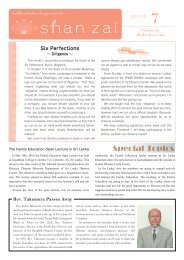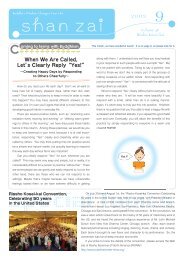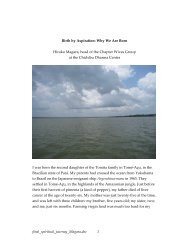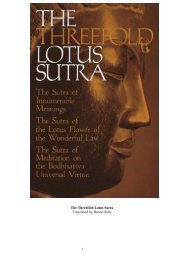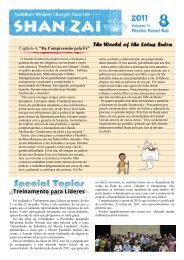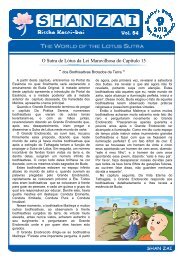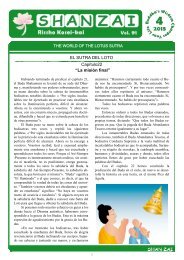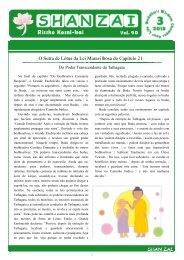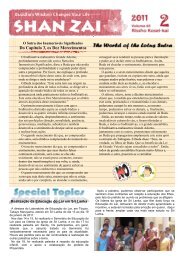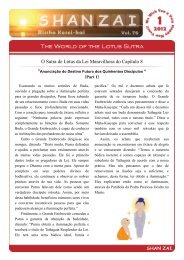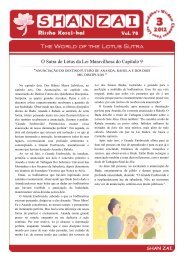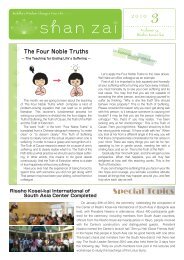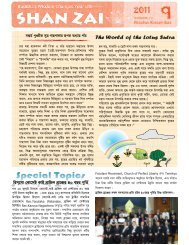ATTITUDE MAKES ALL THE DIFFERENCEJoy and DiscontentEveryone on earth wishes <strong>to</strong> be happy, but many people never do become truly content. Frommy own perspective, it seems that <strong>the</strong> reason <strong>the</strong>y are not happy is that <strong>the</strong>y do not try <strong>to</strong> feel<strong>the</strong> joy that exists in <strong>the</strong>ir immediate circumstances. There is actually no condition that can becalled "happiness"; ra<strong>the</strong>r, <strong>the</strong>re is only a sense of being happy.For example, one person may think that a rainy day is gloomy while ano<strong>the</strong>r may welcome <strong>the</strong>rain. The reality of <strong>the</strong> rain is one and <strong>the</strong> same, but <strong>the</strong> ways <strong>the</strong> two feel about it are exactly<strong>the</strong> opposite. The one who can rejoice in <strong>the</strong> rain is <strong>the</strong> one who is happier. The same is true ofwork. When trouble arises at work, <strong>the</strong>re are some who want <strong>to</strong> give up in despair, and <strong>the</strong>n<strong>the</strong>re are o<strong>the</strong>rs who see difficulties as a challenge and rouse <strong>the</strong>mselves <strong>to</strong> action. It seemsthat happiness depends on how one looks at things, how one appraises things, and how oneresponds <strong>to</strong> things.The root of <strong>the</strong> Japanese word for happiness, shiawase, matches this way of thinking perfectly.According <strong>to</strong> a major Japanese dictionary, shiawase is <strong>the</strong> noun form of a verb meaning "<strong>to</strong> actflexibly according <strong>to</strong> circumstances." The peace of mind one gains from such action is what wecall happiness.One of <strong>the</strong> teachings of Buddhism is that <strong>the</strong> whole universe is contained in a single thought ofone individual (ichinen sanzen, or "three thousand realms in one mind"). It means that <strong>the</strong>world around us changes when we change our attitude.To those who are discontented and irritable, all <strong>the</strong>y see and hear is depressing. The worldaround <strong>the</strong>m is like <strong>the</strong> unpleasant odor that surrounds a drainage ditch. In contrast, when wehave a single thought that is bright and pure, everything around us is proportionately brighterand purer. When <strong>the</strong> wea<strong>the</strong>r improves, just look at how <strong>the</strong> blue sky spreads wider and widerand <strong>the</strong> banks of clouds dissipate as <strong>the</strong>y are blown before <strong>the</strong> rising air currents. One must callforth this sort of updraft from within one's own heart.Along with many people in <strong>the</strong> world who seem unable <strong>to</strong> feel happy, <strong>the</strong>re are some whoseem <strong>to</strong> be masters of <strong>the</strong> art of enjoying life. One was Tachibana Akemi (1812‐‐68), a poet andscholar of Japanese classical literature. In Dokurakugin (Reciting Poetry for My Own Pleasure), acollection of fifty‐two poems, he writes:Pleasure is getting up in <strong>the</strong> morningAnd seeing a blossom that had not been <strong>the</strong>reThe day before.Pleasure is awakening after a nap <strong>to</strong> findRain sprinkling <strong>the</strong> garden.He expresses pleasure at such small things as <strong>the</strong> blossoming of a plant and a midday shower.One who has this eye for <strong>the</strong> joys of life can be said <strong>to</strong> be happy.Tachibana lauds o<strong>the</strong>r pleasures:6
Pleasure is filling <strong>the</strong> empty rice binKnowing <strong>the</strong>re is enough for ano<strong>the</strong>r month.Pleasure is when a rare fish delicacy is servedAnd all <strong>the</strong> children relish it, exclaiming,"That's good!"Tachibana was a man who aimed at honest poverty. In his poems he straightforwardlyexpresses <strong>the</strong> joy of being able, because he has even a small income, <strong>to</strong> fill <strong>the</strong> rice bin when<strong>the</strong> bot<strong>to</strong>m had been exposed, and of being able <strong>to</strong> have something good <strong>to</strong> eat for <strong>the</strong> firsttime in a long while. Herein lies <strong>the</strong> wisdom of being satisfied with little and experiencing greatjoy.As happiness is not just an abstract notion, nei<strong>the</strong>r is misery. However, if one gets in<strong>to</strong> <strong>the</strong> habi<strong>to</strong>f being discontented and dissatisfied, <strong>the</strong>n a feeling of displeasure will fasten on whatevertakes place around one.It appears that <strong>the</strong>re are many people who feel happiness only when <strong>the</strong>y experience somegreat joy once or twice a year. But if instead of hoping for rare moments of great elation, <strong>the</strong>ymanaged <strong>to</strong> find pleasure in small, everyday things, <strong>the</strong>ir lives would be much happier.Even in our daily work, it is possible <strong>to</strong> see things through eyes of joy as Tachibana did:Pleasure is talking with a co‐worker at <strong>the</strong> next deskAbout one's good work.Pleasure is <strong>the</strong> animation that takes overWhen urgent business suddenly comes in.Pleasure is being thanked by a regular cus<strong>to</strong>merAnd saying, "Thank you," exchanging smiles.At work, though <strong>to</strong>ugh problems may come one right after ano<strong>the</strong>r, we should not think of<strong>the</strong>m as hardships, but as pleasures. We can encourage ourselves by believing that dealing withdifficult tasks makes us stronger. With this attitude, work becomes fun.In <strong>the</strong> late eighteenth century <strong>the</strong>re lived in <strong>the</strong> village of Bizen, in what is now OkayamaPrefecture, a man named Aburaya Yoichibe, who was in <strong>the</strong> habit of saying "Thank goodness"quite often. When he awoke in <strong>the</strong> morning and saw his mo<strong>the</strong>r's face, he would say, "Thankgoodness," and when he saw his wife he would say <strong>the</strong> same thing. Villagers nicknamed himGrateful Yoichibe. Once he stumbled on a s<strong>to</strong>ne and injured his knee, and although bloodpoured from <strong>the</strong> wound, he said as always, "Thank goodness!" A villager who was with himasked him why he was so grateful even though he had been injured. He replied, "I'm thankful Igot off with only a small scratch." Like Tachibana, Yoichibe knew <strong>the</strong> key <strong>to</strong> happiness.There are many ups and downs in life. Some things seem fortunate and o<strong>the</strong>rs not. If one isrebuked for a mistake at work, one can take comfort in accepting <strong>the</strong> rebuke as good medicineand vow <strong>to</strong> be more careful. Just as it used <strong>to</strong> be said in Japan that <strong>the</strong> world is as kind as it iscruel, if <strong>the</strong>re is someone who reprimands, <strong>the</strong>re is also someone who consoles. What isimportant is <strong>to</strong> see that <strong>the</strong> one who scolds is also a benefac<strong>to</strong>r. Many executives of leadingcorporations say, "Now that I look back on it, <strong>the</strong> chagrin I felt at being reprimanded on acertain occasion became a great asset."7
- Page 1 and 2: Invisible EyelashesSeeing What is C
- Page 3 and 4: THE TWO FUNCTIONS OF A CELL 55The P
- Page 5: For this to take place, it is vital
- Page 9 and 10: Rose or Thorns?The rose is beautifu
- Page 11 and 12: The Contents of Hotei's SackThe mor
- Page 13 and 14: GratitudeFor the past two decades I
- Page 15 and 16: Looking Into the DepthsEach of us m
- Page 17 and 18: Self‐AwarenessSometimes we allow
- Page 20 and 21: the mountains, Po Chu‐i went to m
- Page 22 and 23: and hesitating to take a first step
- Page 24 and 25: "Nothing has an ego" means that all
- Page 26 and 27: self‐love, endeavoring to develop
- Page 28 and 29: ampant, Dr. Schweitzer devoted his
- Page 30 and 31: Everyone has some ability that is b
- Page 32 and 33: een pondering Kepler's theories of
- Page 34 and 35: improved, I would return home only
- Page 36 and 37: work.In another section, "The Daily
- Page 38 and 39: Hakone, I finished in fifty‐five
- Page 40 and 41: Many people want to work in their o
- Page 42 and 43: eplied, "One hundred divided by two
- Page 44 and 45: at the gate, the Buddha appeared an
- Page 46 and 47: once again sinks into despair, it t
- Page 48 and 49: individuality grows beyond the boun
- Page 50 and 51: this truth, one becomes keenly awar
- Page 52 and 53: suddenly turned irritable and said,
- Page 54 and 55: well in a sport, one obeys the rule
- Page 56 and 57:
There is, however, one infallible r
- Page 58 and 59:
The offering of kind words means sp
- Page 60 and 61:
We must never think of ourselves an
- Page 62 and 63:
The Wind Blowing from the FutureThe
- Page 64 and 65:
Courage That Opens DoorsI have many
- Page 66 and 67:
"Even Insects Work and Eat"My paren
- Page 68 and 69:
Home Is More Than a HavenIn recent
- Page 70 and 71:
Where Affection and Gratitude Begin
- Page 72 and 73:
Forever Young at HeartAlmost every



